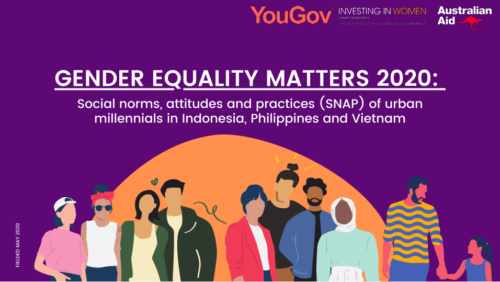Gender Equality Matters 2020: Social norms, attitudes and practices of urban millennials in Indonesia, Philippines and Vietnam
Summary
The Social norms, attitudes and practices (SNAP) 2020 survey report summarises key insights on gender norms and associated behaviours in Indonesia, the Philippines, and Vietnam, drawing on regression and segmentation analyses. It explores correlations between collective and individual attitudes, the influence of social circles, childhood experiences, and media on gender norms. The report compares data from SNAP 2018 and SNAP 2020, identifying COVID-19’s impact on millennials’ income and housework patterns. IW partners work to shift four key gender norms: childcare and housework, breadwinning, job segregation, and leadership. The report highlights the importance of progressive social and media influences in fostering gender equality.
Highlights
- What you see in your social circles matters. The inequality or inequality of others’ attitudes are strongly linked to the equality or inequality of one’s own attitudes. Observations of others’ behaviour are moderately linked to one’s own’s attitudes.
- What you saw growing up matters. Urban millennials who witnessed their parents equally sharing childcare and breadwinning when they were growing up were more likely to practice childcare and breadwinning equality in their own home. For Vietnamese millennials who saw parents practice equality, they were not only more likely to practice equality in their home but also in the way they viewed job segregation and leadership.
- What you see in media matters. Watching progressive media—that is, media where women and men are equally seen taking care of children, doing housework and in leadership roles at work—correlates with more equal behaviour for men and women across all four gender norms in Vietnam and the Philippines and for men in Indonesia on childcare and breadwinning norms.
- If urban millennials in Indonesia, Philippines and Vietnam are going to embrace gender equality, they will need to see others – from their social circles and in the media – embracing gender equality too.
View other SNAP survey reports:
Gender Equality Matters 2022: Social Norms, Attitudes, and Practices (SNAP) Survey
Download Resources Here


